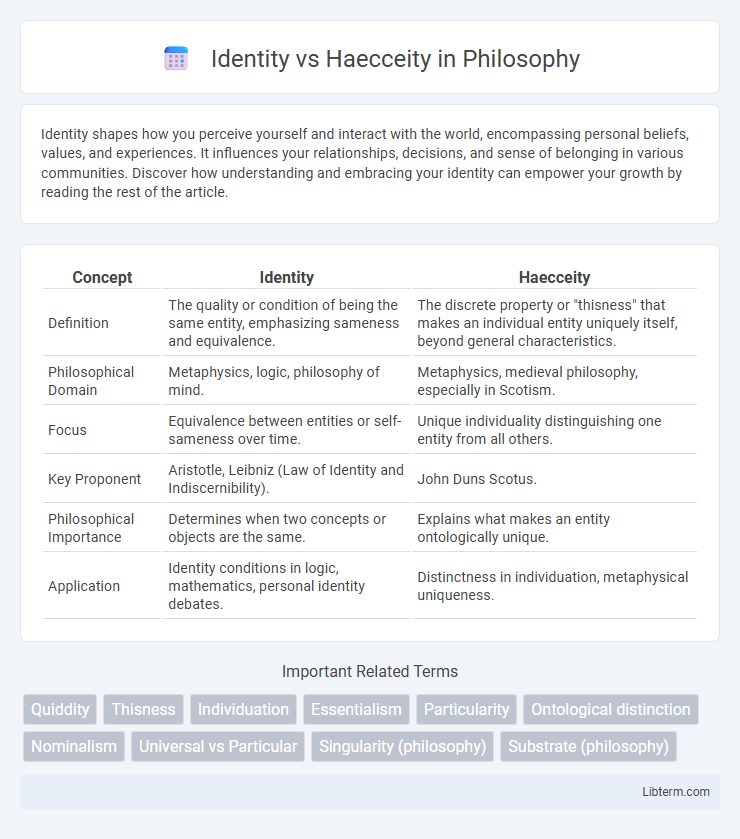Identity shapes how you perceive yourself and interact with the world, encompassing personal beliefs, values, and experiences. It influences your relationships, decisions, and sense of belonging in various communities. Discover how understanding and embracing your identity can empower your growth by reading the rest of the article.
Table of Comparison
| Concept | Identity | Haecceity |
|---|---|---|
| Definition | The quality or condition of being the same entity, emphasizing sameness and equivalence. | The discrete property or "thisness" that makes an individual entity uniquely itself, beyond general characteristics. |
| Philosophical Domain | Metaphysics, logic, philosophy of mind. | Metaphysics, medieval philosophy, especially in Scotism. |
| Focus | Equivalence between entities or self-sameness over time. | Unique individuality distinguishing one entity from all others. |
| Key Proponent | Aristotle, Leibniz (Law of Identity and Indiscernibility). | John Duns Scotus. |
| Philosophical Importance | Determines when two concepts or objects are the same. | Explains what makes an entity ontologically unique. |
| Application | Identity conditions in logic, mathematics, personal identity debates. | Distinctness in individuation, metaphysical uniqueness. |
Understanding Identity: Definitions and Concepts
Identity refers to the set of characteristics, qualities, or attributes that make an entity distinct and recognizable, forming the foundation of its selfhood. Haecceity, a concept introduced by medieval philosopher Duns Scotus, emphasizes the unique, indivisible "thisness" that differentiates one individual from another beyond shared properties. Understanding identity involves distinguishing between qualitative attributes common to a category and the haecceity that confers singular originality to each entity.
Haecceity Explained: The Essence of Uniqueness
Haecceity refers to the discrete qualities or characteristics that make an individual entity uniquely itself, distinguishing it from all others despite sharing general properties. This concept highlights the intrinsic "thisness" or the essence of uniqueness that cannot be replicated or reduced to common features. In philosophical discussions, haecceity underpins debates on identity by emphasizing the non-qualitative aspects that define individual existence.
Historical Perspectives on Identity and Haecceity
Historical perspectives on identity and haecceity trace back to medieval scholastic philosophy, particularly in the works of Duns Scotus, who introduced haecceity as the discrete property that makes an individual uniquely itself, distinct from its general nature or essence. Early modern philosophers like John Locke emphasized personal identity through memory continuity, while Leibniz asserted identity as the principle of the indiscernibility of identicals, rejecting haecceity as a metaphysical primitive. Contemporary philosophical discourse revisits haecceity to address challenges in metaphysics and personal identity debates, emphasizing its role in individuation beyond qualitative properties.
Key Philosophers in the Debate
Key philosophers in the debate on Identity vs Haecceity include Duns Scotus, who introduced the concept of haecceity as the discrete "thisness" that individuates entities beyond their qualitative properties. G.E. Moore and Bertrand Russell contributed to discussions on identity by emphasizing logical and linguistic analysis, challenging haecceity's metaphysical necessity. Contemporary philosophers like David Wiggins have further refined the discourse by analyzing identity conditions through modal and metaphysical frameworks.
Identity in Metaphysics: Principles and Paradoxes
In metaphysics, identity refers to the principle that an entity is numerically the same as itself across time and possible worlds, ensuring consistency in its existence and properties. This concept confronts paradoxes such as the Ship of Theseus, challenging the notion of sameness when an object's components change. Philosophical analysis of identity navigates distinguishing between qualitative similarity and numerical uniqueness, crucial for understanding persistence and individuation.
Haecceity in Ontological Discourse
Haecceity, in ontological discourse, refers to the discrete qualities or properties that render an individual entity uniquely itself, distinguishing it from all others. This concept is critical in metaphysics for explaining individual identity beyond general essences or universal attributes. Haecceity emphasizes the non-repeatable, singular aspects of being that constitute the essence of particularity in existence.
Identity vs. Haecceity: Core Differences
Identity refers to the set of characteristics or qualities that define an entity as the same over time and across contexts, emphasizing sameness and continuity. Haecceity, a term coined by philosopher Duns Scotus, denotes the unique, individual essence that makes an entity this very one, highlighting distinctness and particularity. The core difference lies in identity capturing general sameness, while haecceity stresses irreducible uniqueness.
Practical Implications in Philosophy and Science
Identity and haecceity play crucial roles in philosophy and science by addressing how individuals are distinguished within categories and over time, impacting theories of persistence and change. In philosophy, understanding haecceity--the unique "thisness" of an entity--helps clarify debates on personal identity, grounding discussions on moral responsibility and consciousness. Scientific applications include differentiating particles or biological organisms beyond general properties, enabling precise classifications and tracking individual behaviors in studies of evolution and quantum mechanics.
Criticisms and Counterarguments
Criticisms of identity often highlight its reliance on fixed, universal criteria, which can overlook the nuanced individuality captured by haecceity, emphasizing the unique "thisness" of entities. Counterarguments defend identity by arguing it provides necessary stability for logical reasoning and classification, while haecceity's focus on singularity may lead to ambiguity and hinder consistent comparisons. Philosophers debate the balance between these concepts, considering haecceity essential for acknowledging individuality, whereas identity ensures coherence in metaphysical and epistemological frameworks.
Future Directions in the Study of Identity and Haecceity
Future directions in the study of identity and haecceity emphasize integrating interdisciplinary perspectives from philosophy, cognitive science, and artificial intelligence to deepen understanding of individual uniqueness. Advances in quantum computing and information theory offer novel frameworks to examine identity persistence and transformation at both macroscopic and microscopic levels. Emerging research also explores the implications of digital identities and virtual realities, challenging traditional notions of haecceity in the context of technological embodiment and data ontology.
Identity Infographic

 libterm.com
libterm.com